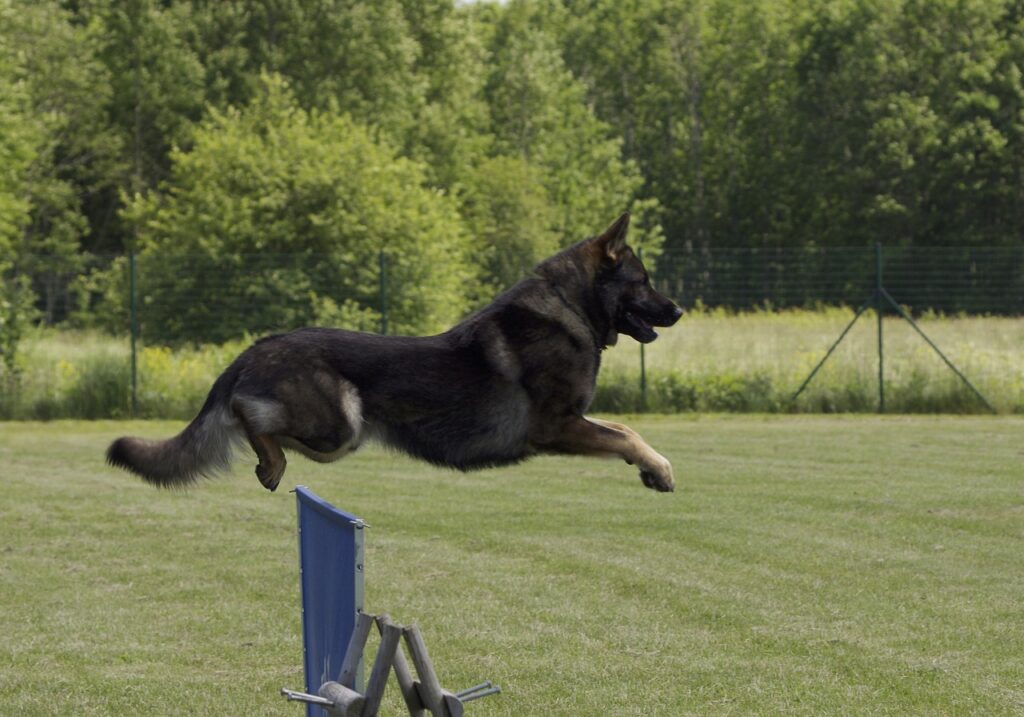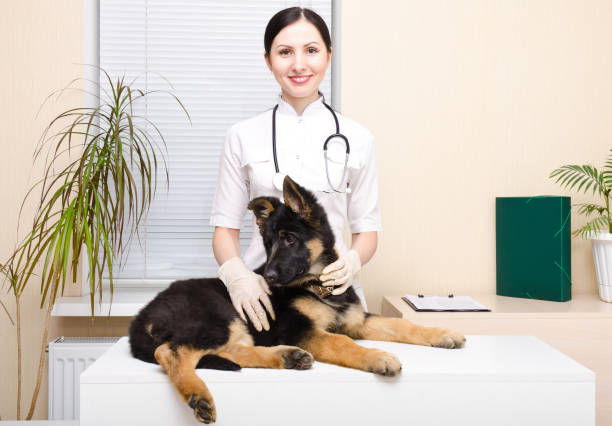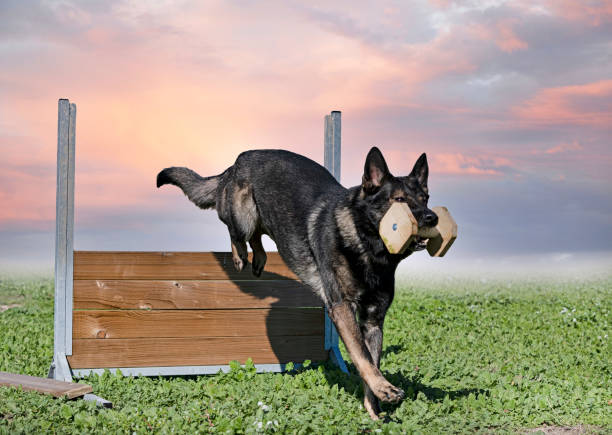The German Shepherd dog breed is known for its muscular build and athletic nature. Keeping your German Shepherd weight is vital for their physical strength and overall health. So, what is the ideal weight for a German Shepherd? Let’s explore the weight standards that can help you keep your dog fit and healthy.
Proper weight management for German Shepherds helps prevent joint issues and other health problems. With their energetic lifestyle, they need a balanced weight for peak performance and longevity. Knowing what’s normal for your dog’s age, gender, and body structure can make all the difference in their health journey.
Male Weight and Height Chart
Male German Shepherds are generally larger than females, with a sturdy, muscular frame. Their weight varies based on genetics and activity level, but they typically fall within a specific range as they grow.
Average Male Weight in kg by Age
Here’s a general weight chart for male German Shepherds at different life stages:
- Puppy (0-6 Months): 9-20 kg
- Adolescent (6-12 Months): 25-32 kg
- Adult (1-3 Years): 34-40 kg
- Mature Adult (3+ Years): 34-41 kg
These ranges provide a guideline, though individual dogs may fall slightly outside these averages.
Female Weight and Height Chart
Female German Shepherds tend to be slightly smaller and lighter, but they still carry a muscular and athletic build. Below is a chart showing average weights by age.
Average Female Weight in kg by Age
- Puppy (0-6 Months): 7-18 kg
- Adolescent (6-12 Months): 20-28 kg
- Adult (1-3 Years): 29-34 kg
- Mature Adult (3+ Years): 30-35 kg
Female German Shepherds can vary in size, so consult with a vet to ensure your dog stays within a healthy weight range.
How German Shepherd Weight Impacts Their Health
A healthy weight is crucial for preventing a range of issues, from joint damage to heart disease. Knowing how weight influences their health can help you make better decisions for your German Shepherd.
Health Risks of Being Overweight
An overweight German Shepherd is at risk for hip dysplasia, arthritis, and decreased mobility. Carrying extra weight places strain on joints, which can cause discomfort and shorten their lifespan. Managing weight early can prevent these issues and ensure they live an active life.
Risks of Being Underweight in German Shepherds
While obesity is a concern, being underweight can also harm a German Shepherd’s health. Underweight dogs may experience muscle loss, poor immunity, and a lack of energy. Monitoring weight and providing a nutritious diet are essential to their health and well-being.
Factors Affecting German Shepherd Weight
Several factors influence your German Shepherd’s weight, from diet to genetics. Understanding these can help you take steps to maintain a balanced weight for your dog.
Diet and Nutrition
A German Shepherd’s diet is key to their weight management. High-protein foods with balanced fats and carbohydrates support their active lifestyle. Avoiding excessive treats and table scraps can also help prevent unwanted weight gain.
Exercise and Activity Levels

Exercise plays a major role in maintaining a German Shepherd’s ideal weight. These dogs thrive on daily physical activities, including running, walking, and mental stimulation. Lack of exercise can lead to weight gain and behavior issues, so aim for at least one hour of daily exercise.
Genetics and Breed Lines
German Shepherds come from various breed lines with differing body structures. Some lines may naturally carry more weight, while others remain leaner. Genetics also impact metabolism, so it’s essential to adjust diet and exercise to fit your dog’s specific needs.
German Shepherd Weight by Age: Growth Stages
German Shepherds go through distinct growth stages, each with its weight milestones. Understanding these stages can guide you in monitoring their development.
Puppy Stage Weight Expectations (0-6 Months)
Puppies experience rapid growth, with weight doubling in the first few months. At this stage, a high-protein diet supports muscle and bone development. Avoid overfeeding to prevent excessive weight gain that may impact their joints.
Adolescent Weight Milestones (6-18 Months)
During adolescence, a German Shepherd continues to gain weight as they grow into their adult size. This stage involves filling out their muscle mass, with growth slowing toward the end of this period. Proper exercise is vital to build strong muscles without adding unnecessary fat.
Adult Weight Stability (18+ Months)
Once they reach adulthood, German Shepherds typically stabilize in weight. Maintaining a balanced diet and regular exercise helps keep them fit. Any sudden weight changes at this stage may signal a health issue, so consult a vet if you notice significant fluctuations.
How to Keep Your German Shepherd at a Healthy Weight

Achieving the right weight for your German Shepherd is just the start. Maintaining it requires consistent care, including a balanced diet and exercise routine.
Ideal Diet for German Shepherd Weight Management
A well-balanced diet with quality ingredients is essential. Look for high-quality dog food with lean protein sources and low fillersPrevent overfeeding by adjusting portion sizes according to your pet’s age, weight, and activity level.
Exercise Recommendations for Weight Control
German Shepherds require daily exercise to keep a healthy weight. Activities like running, hiking, and fetch are great for their energy levels. Consistent exercise helps prevent weight gain and keeps their minds engaged, reducing the risk of boredom-related behavior issues.
When to Consult a Veterinarian About Their Weight

Regularly tracking your dog’s weight is essential, and if you notice any significant changes, it’s a good idea to consult a vet. Certain health issues may contribute to weight gain or loss, so routine vet visits help catch these early.
Warning Signs of Weight Issues
If your German Shepherd is lethargic, has difficulty breathing, or shows signs of joint pain, weight may be a factor. Similarly, a visible rib cage or lack of muscle can indicate underweight issues. A vet can provide guidance to bring your dog back to a healthy range.
FAQs
- What is the ideal weight range for a male German Shepherd?
Male German Shepherds typically weigh between 34 and 41 kg as adults, depending on their size and structure. - How much should a female German Shepherd weigh?
Adult female German Shepherds usually weigh between 30 and 35 kg. - What are the indicators that my German Shepherd is underweight?
- If your dog’s ribs are highly visible or they lack muscle, they may be underweight. Consult a vet for guidance.
- What diet is best for maintaining German Shepherd weight?
A high-protein, balanced diet with limited fillers is ideal for German Shepherds. Portion control is also key. - At what age do German Shepherds fully reach their weight?
Most German Shepherds reach their full weight between 18 and 24 months, though they may continue filling out slightly beyond that.
Conclusion:
It is necessary to maintain the German shepherd’s weight, which involves proper diet, regular exercise, and routine vet checkups. Paying close attention to their weight and adjusting their food and activity levels accordingly can help prevent a range of health issues that may arise from being overweight or underweight. Remember that each dog is rare, so it’s essential to tailor your approach to your dog’s needs. With the right care and attention, your German Shepherd can stay fit, energetic, and happy for years.

